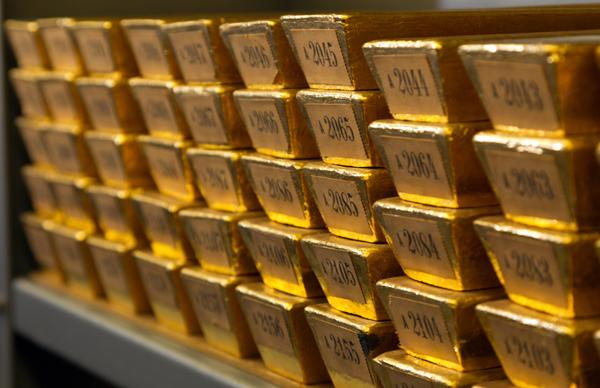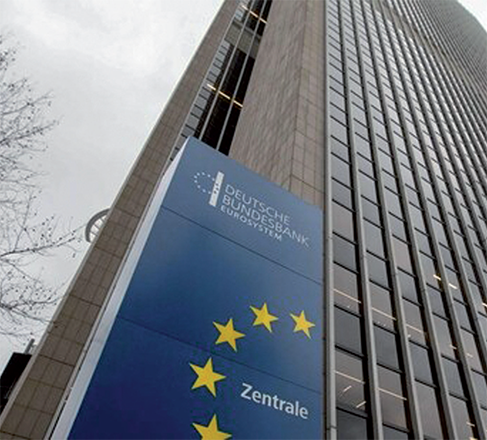You are here
In uncertain times, Germany takes more gold home
By Reuters - Jan 27,2016 - Last updated at Jan 27,2016

This undated handout image made available by the German central bank (Deutche Bundesbank) shows gold stored in the vault of the bank in Frankfurt (AFP photo)
FRANKFURT — Germany's Bundesbank took more than 200 tonnes of its gold back to Frankfurt from overseas last year, the central bank said on Wednesday, as it moves towards hoarding half of the world's second-largest reserve at home.
In the wake of the eurozone crisis, many ordinary Germans want to see more of the 3,381 tonnes of gold in vaults at home and some have even questioned whether it still exists, prompting the Bundesbank to recently publish a long list of gold bars.
Just over 40 per cent of the reserve, which Germany started building in the post-war boom years, is now held underground at the Bundesbank in Frankfurt, while almost the same amount is stored at the Federal Reserve in the United States.
Holding gold reserves abroad is a legacy of the Bretton Woods system of currency management established after World War II. Much of the precious metal stayed there during the Cold War, when the former Soviet Union occupied eastern Germany.
As well as the reserves in the United States another 400 tonnes of German gold are held by the Bank of England. London and New York are centres for gold trading as well as home to two global currencies and, in an emergency, gold stored at those centres could be converted into sterling or dollars.
France, Germany's closest political ally in the eurozone, keeps less than half the amount stored in London and will have none at all by 2020 when half of the overall reserve will be guarded in Germany's financial centre.
The impact of the global financial crisis has been mild in Germany compared with other European countries, but many Germans are suspicious of the euro project after an economic crisis almost fractured the currency, used by 19 European countries.
In uncertain times, gold is considered a safe asset, even though its value has recently fallen.
Proof that it is still in safe hands is important for many Germans. The Bundesbank said all gold bars are "thoroughly and exhaustively inspected and verified" on arrival.
Germany's gold holding, which is valued at roughly $130 billion, is the second biggest in the world, after the United States. The German reserve is roughly twice that of China, according to the World Gold Council, an industry body.
Separately, Germany has lowered its growth forecast for 2016 in the face of an emerging market slowdown that is dampening exports, leaving domestic demand as the sole pillar of support for Europe's biggest economy this year.
Presenting the government's annual economic report, Vice Chancellor Sigmar Gabriel said on Wednesday the economy was in good shape but the government and companies alike needed to beef up investment to keep Germany competitive.
"We're doing well in Germany, but for that to remain the case we need to invest more," Gabriel told a news conference.
In 2015, state spending rose to nearly 30 billion euros ($32.63 billion), pushing up the public sector investment ratio to 20.45 per cent of gross domestic product, slightly above the international Organisation for Economic Cooperation and Development average, he noted.
Still, the government needed to speed up digitisation, do more to promote electric cars and facilitate private investment, Gabriel said, adding that Finance Minister Wolfgang Schaeuble's goal of a balanced budget should not be seen as a dogma.
In its annual economic report, the government expects private consumption and state spending to drive economic growth by 1.7 per cent this year, on a par with the 2015 performance, but below a previous forecast of 1.8 per cent.
The report underlined a fundamental shift in Germany's economy away from a reliance on exports and towards more domestic-driven growth as demand from China and other emerging markets is waning.
Berlin expects imports to rise at a faster rate than exports throughout 2016, meaning net foreign trade is likely to clip off 0.4 percentage points of economic growth.
This is a remarkable development for an economy that for decades has relied mainly on exports to countries around the globe, led by its engineering and auto sectors.
Capital Economist analyst Jennifer McKeown remarked that even a sharp slowdown in China would not be enough on its own to push Germany into recession.
"But if, contrary to our forecasts, a slowdown in China prompted a more generalised slowdown in global demand, this would hit the German economy very hard," she said.
The shift leaves domestic demand as the sole propellant of growth this year and probably beyond. Berlin expects a rise in consumer spending by 1.9 per cent and spikes in construction investment by 2.3 per cent and of state spending by 3.5 per cent.
Rising real wages, rock-bottom interest rates and record-low car fuel costs due to the plunge in oil prices are giving a strong boost to consumer purchasing powers.
Related Articles
The German central bank or Bundesbank said Monday that it stepped up the repatriation of its gold reserves from overseas storage last year.
FRANKFURT — Germany, Europe's biggest economy, shaved 24 billion euros ($27 billion) off its overall public debt burden to 2.153 trillion eu
FRANKFURT — Germany's "lacklustre" economy will likely stagnate again in the third quarter, the Bundesbank central bank said Monday, as weak



















